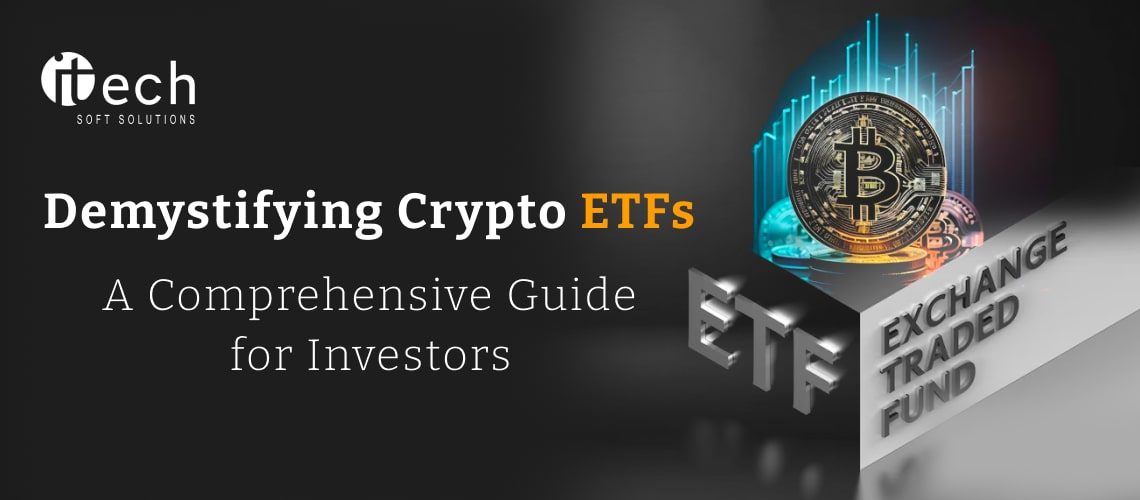Welcome to the world of investing, where old ways mix with new ideas. Exchange-traded funds (ETFs) are part of this change, reshaping how people invest their money. Now, there’s something new: Bitcoin ETFs. Let’s see what ETFs are, their good sides, the risks, and this new thing with Bitcoin.
ETFs are like a mix of different investments, and they’re traded on stock exchanges. They’re good because they give you a lot of options, and they’re easy to buy and sell. Now, with Bitcoin ETFs, you can invest in cryptocurrency in a safe and regulated way. The SEC’s endorsement of Bitcoin ETFs signifies a significant milestone in the cryptocurrency market. It means more people can join in on the digital money world.
What is the Meaning of an ETF?
An Exchange-Traded Fund (ETF) is like a basket of different investments, such as stocks or bonds, that you can buy or sell on a stock exchange. It works a bit like a mutual fund, but it’s traded on the stock market like a regular stock. ETFs can change in price during the day as people buy and sell them. Many ETFs follow an index, which is like a list of specific stocks or bonds. People like investing in ETFs because they usually have low fees, they’re tax-efficient, and they’re easy to buy and sell.
Current Status of Bitcoin ETF Approvals Worldwide:
Here’s a summary of the status regarding the approval of Bitcoin ETFs (Exchange Traded Funds) in various countries:
- United States: Several Bitcoin ETFs have been approved by the Securities and Exchange Commission (SEC), with approvals beginning in late 2021.
- Canada: Canada has approved several Bitcoin ETFs, with the first one launched in February 2021.
- Brazil: Brazil approved its first Bitcoin ETF in March 2021.
- Australia: Approved Bitcoin ETFs in 2022, with offerings available on the Australian Securities Exchange (ASX).
- Switzerland: Switzerland has also approved Bitcoin ETFs.
- Germany: Germany approved its first Bitcoin ETF in July 2020.
- Hong Kong: Hong Kong conditionally approved its first spot in Bitcoin and Ether ETFs on April 15, 2024.
- Other Countries: Various regions are either considering or have initiated financial products akin to ETFs, reflecting changing regulatory environments.
How Does an ETF Operate?
ETFs are looked after by professionals who handle the assets in the fund to keep it on track with its goals. The price of an ETF’s shares goes up and down during the trading day as people buy and sell them. Unlike mutual funds, which only trade once a day, ETFs are active all day during trading hours. They usually hold assets like stocks, commodities, or bonds, and their trading price stays close to their total asset value.
Varieties of ETFs Known.
ETFs come in different types to work different investment needs. Stock ETFs follow detailed indices, giving access to a mix of stocks. Bond ETFs offer exposure to fixed-income markets for potential income and diversity. Sector ETFs focus on industries like tech or healthcare. There are also international ETFs for global exposure and thematic ETFs for emerging trends.
Advantages and Disadvantages of Exchange-Traded Funds (ETFs)
Advantages of Investing in Exchange-Traded Funds (ETFs).
1. Diversification: ETFs let you invest in a bunch of different things all at once, like stocks from many companies or bonds from different places. This helps lower the risk because if one investment does poorly, it won’t hurt your whole investment too much. It’s like spreading risk by investing in multiple options.
2. Cost-Effectiveness: ETFs are cheaper compared to other types of investments like mutual funds. This is because they don’t need lots of people making decisions about what to invest in. So, you end up paying less in fees, which means you keep more of your money.
3. Flexibility: With ETFs, you can buy and sell them whenever the stock market is open. This gives you the freedom to react quickly if something changes in the market. You can also choose different ways to buy or sell ETFs, depending on what works best for you.
4. Transparency: ETFs tell you exactly what they’re investing in every day. This helps you understand where your money is going and how it’s doing. Knowing what’s inside the ETF helps you decide if it’s the right investment for you and if it matches your goals. Plus, it builds trust because you can see everything that’s happening with your investment.
Disadvantages of Investing in Exchange-Traded Funds (ETFs).
1. Market Risk: ETFs can go up or down in value because of changes in the overall stock market. This means if the stock market goes down, your ETF investment might lose value too. It’s like riding a rollercoaster – sometimes it goes up, sometimes it goes down.
2. Liquidity Threat: Some ETFs might not be easy to buy or sell quickly because not many people are trading them. This can be a problem if you need to sell your investment fast but can’t find anyone to buy it. It’s like trying to sell something that nobody wants to buy.
3. Tracking Mistake: Sometimes an ETF doesn’t follow its index perfectly, which means it might not perform exactly like the index it’s supposed to track. This could happen because of fees or other factors. It’s like trying to follow a recipe but ending up with a slightly different dish.
4. Fees Effect: ETFs usually have lower fees compared to other investments, but these fees can still eat into your returns over time. It’s important to understand how much you’re paying in fees and how it affects your overall investment. It’s like paying a small fee every time you use a service – it might not seem like much at first, but it adds up over time.
Let’s Discover Bitcoin ETFs
A Bitcoin ETF is a new type of investment that follows the price of Bitcoin and is traded on regular stock exchanges. Instead of buying Bitcoin directly, which can be complicated, Bitcoin ETFs let people bet on Bitcoin’s price changes using a regular investment account. This makes it easier for everyday investors who aren’t familiar with cryptocurrencies to get involved in Bitcoin.
How Bitcoin ETFs Operate?
Bitcoin ETFs work by either owning real Bitcoins or using financial agreements like futures contracts. When investors buy shares in these ETFs, they’re getting a piece of the actual Bitcoins or the agreements. The worth of these shares is tied to the price of Bitcoin in the market. What makes Bitcoin ETFs significant is the supervision from regulators, ensuring a safe and organized investment space, which tackles worries like security and price changes linked to cryptocurrencies.
How to Invest in Bitcoin ETFs?

Investing in a Bitcoin ETF is like investing in any other type of ETF. Here are the steps you should follow:
1. Choose a Broker: First, pick a brokerage firm where you’ll open an account. There are lots of choices, so pick the one that fits what you want.
2. Open Your Account: To open your brokerage account, you’ll need to provide some personal information and agree to the broker’s terms and conditions.
3. Fund Your Account: Once your account is set up, you’ll transfer money from your bank account to your brokerage account. This money will be used to buy the ETF shares.
4. Buy the ETF: With your account funded, you can search for the Bitcoin ETF you want to invest in. Once you find it, specify how many shares you’d like to purchase and complete the transaction.
Before you invest, think about how much risk you’re comfortable with, what you want to achieve with your investment, and any fees associated with the ETF. It’s also wise to research the ETF’s performance history, investment strategy, and the people managing it. Gain valuable insights to empower your investment decisions through this resource.
Conclusions
In conclusion, Exchange-Traded Funds (ETFs) have appeared as a user-friendly way for investors to dive into the financial market, offering a mix of old-school investment strategies with modern convenience. Now, with the arrival of Bitcoin ETFs, the investment landscape has expanded, making it easier for everyday people to dip their toes into the world of cryptocurrency without the complexities of direct ownership. While ETFs boast advantages like low costs, flexibility, and clear transparency, it’s essential to weigh the risks, including market fluctuations and liquidity issues.
To make the most of ETF investments, individuals should conduct thorough research, carefully select brokerage platforms, and align their investment choices with their financial goals. By grasping the fundamentals of ETFs and Bitcoin ETFs, investors can confidently navigate the investment realm, taking opportunities while mitigating potential surprises. Ultimately, with the right approach and understanding, ETFs can serve as valuable tools for building diverse investment portfolios and working toward long-term financial success.



